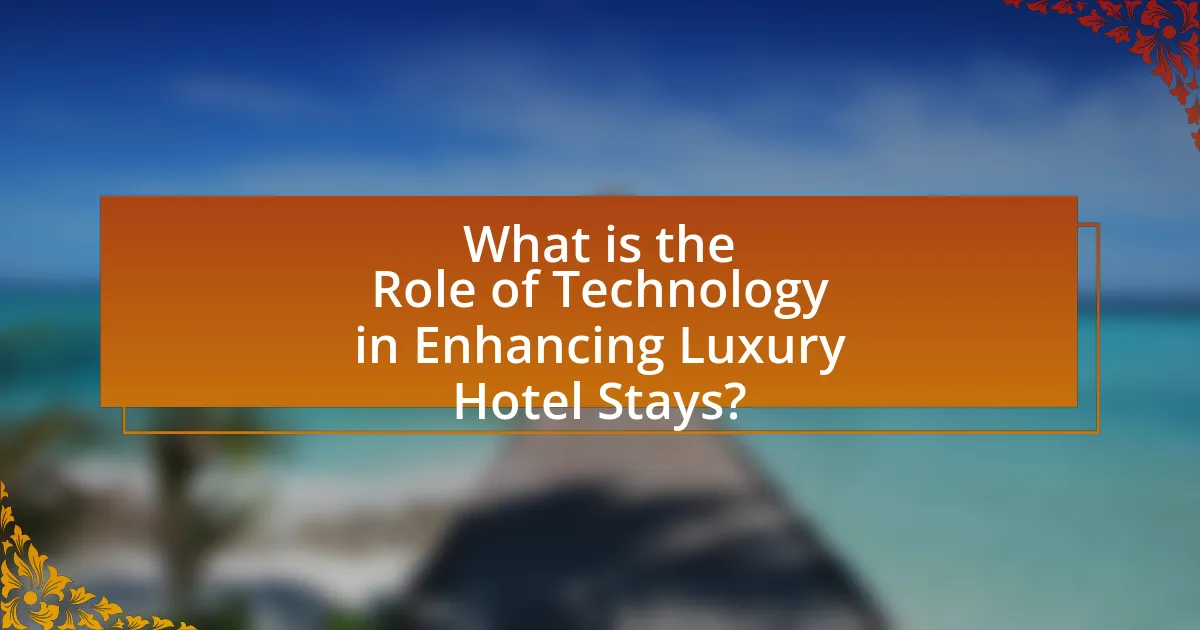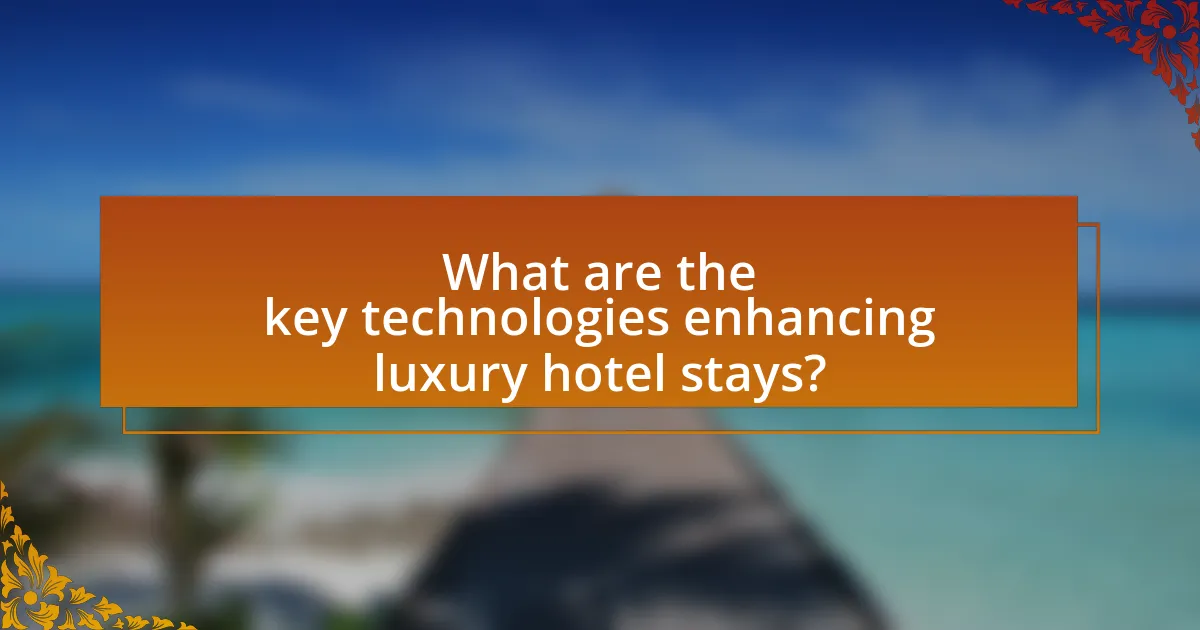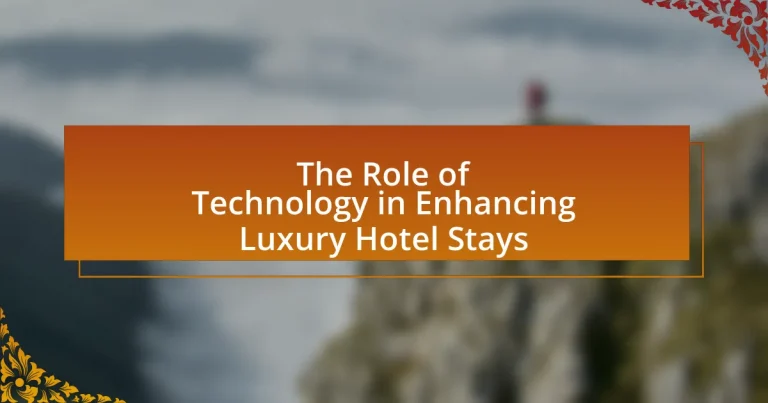The article focuses on the role of technology in enhancing luxury hotel stays, highlighting how advancements such as smart room controls, mobile apps, and artificial intelligence improve guest experiences and operational efficiency. It discusses the transformation of luxury hospitality through personalized services, streamlined check-in processes, and data-driven insights that cater to individual preferences. Key technologies, including mobile check-in systems and customer relationship management platforms, are examined for their impact on guest satisfaction and loyalty. The article also addresses the challenges luxury hotels face in adopting new technologies and outlines best practices for effective integration, ensuring a competitive edge in the evolving hospitality market.

What is the Role of Technology in Enhancing Luxury Hotel Stays?
Technology plays a crucial role in enhancing luxury hotel stays by providing personalized experiences, improving operational efficiency, and facilitating seamless guest interactions. For instance, advanced booking systems allow guests to customize their reservations, while mobile apps enable easy access to hotel services, such as room service and concierge assistance. Additionally, smart room technologies, including automated lighting and climate control, create a tailored environment that meets individual preferences. According to a study by the Cornell University School of Hotel Administration, hotels that implement technology-driven solutions see a significant increase in guest satisfaction and loyalty, demonstrating the effectiveness of technology in elevating the luxury experience.
How has technology transformed the luxury hotel experience?
Technology has transformed the luxury hotel experience by enhancing personalization, efficiency, and guest engagement. Smart room controls allow guests to customize lighting, temperature, and entertainment systems to their preferences, creating a tailored environment. Mobile apps facilitate seamless check-in and check-out processes, reducing wait times and improving convenience. Additionally, artificial intelligence-driven chatbots provide instant customer service, addressing guest inquiries and requests in real-time. According to a 2021 report by Deloitte, 70% of luxury hotel guests prefer personalized experiences, highlighting the importance of technology in meeting these expectations.
What specific technologies are commonly used in luxury hotels?
Luxury hotels commonly use advanced technologies such as smart room controls, mobile check-in and check-out systems, high-speed internet access, and personalized guest experience platforms. Smart room controls allow guests to adjust lighting, temperature, and entertainment systems through mobile devices or voice commands, enhancing comfort and convenience. Mobile check-in and check-out streamline the arrival and departure process, reducing wait times and improving guest satisfaction. High-speed internet access is essential for business and leisure travelers, ensuring connectivity throughout the stay. Personalized guest experience platforms utilize data analytics to tailor services and recommendations to individual preferences, further elevating the luxury experience. These technologies collectively contribute to a seamless and enjoyable stay for guests in luxury hotels.
How do these technologies improve guest satisfaction?
Technologies improve guest satisfaction by providing personalized experiences and streamlined services. For instance, mobile check-in and keyless entry systems reduce wait times, allowing guests to access their rooms quickly and conveniently. Additionally, smart room controls enable guests to customize their environment, such as adjusting lighting and temperature, enhancing comfort. According to a study by Cornell University, hotels that implement technology-driven personalization see a 20% increase in guest satisfaction scores. This data underscores the effectiveness of technology in meeting and exceeding guest expectations.
Why is technology important for luxury hotels?
Technology is important for luxury hotels because it enhances guest experiences and operational efficiency. Luxury hotels utilize advanced technologies such as mobile check-in, smart room controls, and personalized service platforms to meet the high expectations of their clientele. For instance, a study by Cornell University found that hotels implementing mobile technology saw a 20% increase in guest satisfaction scores. This integration of technology not only streamlines operations but also allows for tailored experiences, ensuring that luxury hotels remain competitive in a rapidly evolving market.
What competitive advantages does technology provide to luxury hotels?
Technology provides luxury hotels with competitive advantages such as enhanced guest experience, operational efficiency, and personalized services. Enhanced guest experience is achieved through innovations like mobile check-in, smart room controls, and virtual concierge services, which streamline processes and elevate comfort. Operational efficiency is improved by utilizing property management systems and data analytics, allowing hotels to optimize staffing and resource allocation, ultimately reducing costs. Personalized services are facilitated through customer relationship management systems that analyze guest preferences and behaviors, enabling tailored offerings that increase guest satisfaction and loyalty. These advantages collectively position luxury hotels to attract and retain discerning clientele in a competitive market.
How does technology influence customer loyalty in luxury hospitality?
Technology significantly influences customer loyalty in luxury hospitality by enhancing personalized experiences and streamlining service delivery. Luxury hotels utilize advanced technologies such as customer relationship management systems and artificial intelligence to gather and analyze guest data, allowing for tailored services that meet individual preferences. For instance, a study by Deloitte found that 80% of consumers are more likely to make a purchase when brands offer personalized experiences. Additionally, mobile apps and contactless services improve convenience and safety, which are critical in the luxury sector. According to a report by McKinsey, 70% of consumers expect a seamless digital experience, reinforcing the importance of technology in fostering loyalty. Thus, the integration of technology not only meets customer expectations but also builds long-term relationships through enhanced satisfaction and engagement.

What are the key technologies enhancing luxury hotel stays?
Key technologies enhancing luxury hotel stays include mobile check-in and keyless entry systems, smart room controls, personalized guest experiences through AI, and advanced customer relationship management (CRM) systems. Mobile check-in and keyless entry streamline the arrival process, allowing guests to bypass traditional front desk interactions, which enhances convenience and privacy. Smart room controls enable guests to adjust lighting, temperature, and entertainment systems through mobile apps or voice commands, providing a tailored environment. AI-driven personalization analyzes guest preferences to offer customized services, improving overall satisfaction. Advanced CRM systems help hotels manage guest data effectively, enabling targeted marketing and personalized communication, which fosters loyalty and enhances the guest experience.
How do smart room technologies enhance guest comfort?
Smart room technologies enhance guest comfort by providing personalized control over the room environment. These technologies allow guests to adjust lighting, temperature, and entertainment systems through intuitive interfaces, such as mobile apps or voice commands. For instance, a study by the Cornell University School of Hotel Administration found that 70% of guests prefer hotels that offer smart room features, indicating a strong demand for personalized experiences. Additionally, smart technologies can automate tasks like adjusting curtains or managing energy consumption, further improving convenience and comfort during a stay.
What features are included in smart room systems?
Smart room systems include features such as automated lighting, climate control, smart entertainment systems, voice-activated assistants, and integrated security systems. These features enhance guest comfort and convenience by allowing personalized control over the room environment. For instance, automated lighting can adjust based on the time of day or guest preferences, while climate control systems can maintain optimal temperatures automatically. Additionally, smart entertainment systems provide access to streaming services and personalized content, and voice-activated assistants enable hands-free control of various room functions. Integrated security systems enhance safety by allowing guests to monitor access and control locks remotely.
How do guests interact with smart room technologies?
Guests interact with smart room technologies primarily through voice commands, mobile applications, and touch interfaces. These technologies allow guests to control lighting, temperature, entertainment systems, and room service requests seamlessly. For instance, a study by the Cornell University School of Hotel Administration found that 70% of guests prefer using their smartphones to manage room settings, indicating a strong inclination towards mobile app interaction. Additionally, voice-activated assistants, such as Amazon Alexa or Google Assistant, are increasingly integrated into hotel rooms, enabling guests to adjust their environment hands-free, which enhances convenience and personalization during their stay.
What role does mobile technology play in luxury hotel services?
Mobile technology plays a crucial role in luxury hotel services by enhancing guest experiences through convenience and personalization. Luxury hotels utilize mobile apps for seamless check-in and check-out processes, allowing guests to bypass traditional front desk interactions. Additionally, mobile technology enables guests to control room settings, such as lighting and temperature, directly from their smartphones, providing a tailored environment that meets individual preferences. According to a study by Deloitte, 70% of travelers prefer using mobile devices for hotel services, indicating a strong demand for mobile integration in the hospitality sector. This integration not only improves operational efficiency but also fosters guest loyalty by offering a modern, user-friendly experience.
How do mobile apps improve the guest experience?
Mobile apps improve the guest experience by providing convenient access to hotel services and personalized features. Guests can use mobile apps to check-in and check-out seamlessly, order room service, and make reservations for amenities, all from their smartphones. According to a study by the Cornell University School of Hotel Administration, 70% of guests prefer using mobile apps for service requests, indicating a strong demand for this technology. Additionally, mobile apps can offer tailored recommendations based on guest preferences, enhancing satisfaction and engagement during their stay.
What services can guests access through hotel mobile apps?
Guests can access a variety of services through hotel mobile apps, including room booking, check-in and check-out, room service ordering, and concierge services. These apps often allow guests to manage their reservations, request housekeeping, and communicate directly with hotel staff. Additionally, many hotel mobile apps provide access to amenities such as spa bookings, restaurant reservations, and local attraction information. The integration of these services enhances the overall guest experience by providing convenience and personalized options, which is crucial in the luxury hotel sector.

How do luxury hotels implement technology to enhance service delivery?
Luxury hotels implement technology to enhance service delivery through personalized guest experiences, streamlined operations, and advanced communication systems. For instance, many luxury hotels utilize mobile apps that allow guests to check in, control room settings, and request services directly from their smartphones, thereby improving convenience and satisfaction. Additionally, the integration of artificial intelligence and data analytics enables hotels to anticipate guest preferences and tailor services accordingly, such as recommending activities or dining options based on previous stays. Furthermore, the use of smart room technology, including IoT devices, allows for automated adjustments to lighting, temperature, and entertainment systems, creating a more comfortable environment. These technological advancements not only improve operational efficiency but also significantly elevate the overall guest experience, as evidenced by a 2019 study from Cornell University, which found that hotels leveraging technology saw a 20% increase in guest satisfaction ratings.
What are the best practices for integrating technology in luxury hotels?
The best practices for integrating technology in luxury hotels include implementing personalized guest experiences, utilizing smart room technology, and ensuring seamless connectivity. Personalized guest experiences can be achieved through data analytics, allowing hotels to tailor services based on individual preferences, which enhances guest satisfaction. Smart room technology, such as automated lighting, climate control, and voice-activated assistants, provides convenience and luxury, aligning with the expectations of high-end clientele. Additionally, ensuring seamless connectivity through high-speed Wi-Fi and mobile apps for room service and concierge services is essential, as studies show that 85% of travelers prioritize reliable internet access during their stays. These practices not only improve operational efficiency but also elevate the overall guest experience, making technology an integral part of luxury hospitality.
How can staff be trained to use new technologies effectively?
Staff can be trained to use new technologies effectively through structured training programs that include hands-on practice, ongoing support, and clear instructional materials. Implementing a blended learning approach, which combines online modules with in-person workshops, allows staff to familiarize themselves with technology at their own pace while also receiving direct guidance. Research indicates that organizations that provide continuous training and support see a 30% increase in employee proficiency with new technologies, enhancing overall service quality in luxury hotel settings.
What challenges do luxury hotels face when adopting new technologies?
Luxury hotels face significant challenges when adopting new technologies, primarily including high costs, staff training, and integration with existing systems. The financial burden of implementing advanced technologies can strain budgets, as luxury hotels often require cutting-edge solutions that come with substantial investment. Additionally, staff training is crucial; employees must be proficient in using new systems to ensure seamless guest experiences, which can be time-consuming and resource-intensive. Furthermore, integrating new technologies with legacy systems poses technical difficulties, as compatibility issues can disrupt operations and diminish the intended benefits of modernization. These challenges highlight the complexities luxury hotels encounter in their pursuit of technological advancement.
How does technology facilitate personalized guest experiences?
Technology facilitates personalized guest experiences by leveraging data analytics and artificial intelligence to tailor services to individual preferences. For instance, hotels utilize customer relationship management systems to collect and analyze guest data, such as previous stays, preferences for room types, and dining choices. This information enables hotels to customize offerings, such as personalized welcome messages, room settings, and curated activity recommendations. A study by the Cornell University School of Hotel Administration found that 70% of guests are more likely to return to a hotel that recognizes their preferences, demonstrating the effectiveness of technology in enhancing guest satisfaction and loyalty.
What data is collected to tailor services to individual guests?
Luxury hotels collect various types of data to tailor services to individual guests, including personal preferences, booking history, and feedback. Personal preferences encompass dietary restrictions, room temperature settings, and activity interests, which help in customizing the guest experience. Booking history provides insights into past stays, allowing hotels to anticipate needs and preferences for future visits. Feedback, gathered through surveys or direct communication, informs hotels about guest satisfaction and areas for improvement. This data-driven approach enhances guest experiences by ensuring services are aligned with individual expectations and desires.
How do luxury hotels use technology to anticipate guest needs?
Luxury hotels use technology to anticipate guest needs by implementing data analytics, artificial intelligence, and personalized communication systems. These technologies analyze guest preferences and behaviors, allowing hotels to tailor services and amenities accordingly. For instance, data collected from previous stays can inform staff about a guest’s preferred room temperature, dietary restrictions, or favorite activities, enabling a more customized experience. Additionally, AI-driven chatbots and mobile apps facilitate real-time communication, allowing guests to make requests or receive recommendations instantly. This proactive approach enhances guest satisfaction and loyalty, as evidenced by a study from Cornell University, which found that personalized service significantly increases guest retention rates.
What future trends in technology can be expected in luxury hotels?
Future trends in technology for luxury hotels include the integration of artificial intelligence, enhanced personalization through data analytics, and the adoption of smart room technologies. Artificial intelligence will streamline operations, enabling chatbots for customer service and predictive analytics for guest preferences. Enhanced personalization will leverage data analytics to tailor experiences, such as customized room settings and personalized recommendations. Smart room technologies will incorporate IoT devices, allowing guests to control lighting, temperature, and entertainment systems through mobile apps or voice commands, improving convenience and comfort. These trends are supported by industry reports indicating that 70% of luxury hotel guests prefer personalized experiences, highlighting the demand for technological advancements in hospitality.
How might artificial intelligence shape the future of luxury hospitality?
Artificial intelligence will significantly shape the future of luxury hospitality by personalizing guest experiences and optimizing operational efficiency. AI technologies, such as machine learning algorithms and natural language processing, enable hotels to analyze guest preferences and behaviors, allowing for tailored services that enhance satisfaction. For instance, AI-driven chatbots can provide instant customer service, while predictive analytics can anticipate guest needs, leading to improved service delivery. According to a report by McKinsey, hotels that implement AI solutions can increase revenue by up to 10% through enhanced customer engagement and operational efficiencies. This integration of AI not only elevates the guest experience but also streamlines hotel management processes, making luxury hospitality more responsive and efficient.
What emerging technologies should luxury hotels be aware of?
Luxury hotels should be aware of artificial intelligence, Internet of Things (IoT), and blockchain technology. Artificial intelligence enhances customer service through chatbots and personalized recommendations, improving guest experiences. The Internet of Things enables smart room features, allowing guests to control lighting, temperature, and entertainment through their devices, which increases convenience and satisfaction. Blockchain technology offers secure transactions and can streamline loyalty programs, enhancing trust and efficiency in guest interactions. These technologies are increasingly adopted in the hospitality industry, with a report from Deloitte indicating that 70% of hotel executives believe AI will significantly impact their operations by 2025.
What practical tips can luxury hotels follow to enhance technology use?
Luxury hotels can enhance technology use by implementing smart room systems that allow guests to control lighting, temperature, and entertainment through mobile apps or voice commands. This integration of Internet of Things (IoT) technology not only improves guest convenience but also increases energy efficiency, as reported by a study from the American Hotel and Lodging Educational Institute, which found that smart systems can reduce energy consumption by up to 30%. Additionally, luxury hotels should invest in high-speed Wi-Fi and provide seamless connectivity throughout the property, as 85% of travelers consider reliable internet access essential for their stay. Offering mobile check-in and digital concierge services can further streamline guest experiences, allowing for personalized service and quicker response times.


